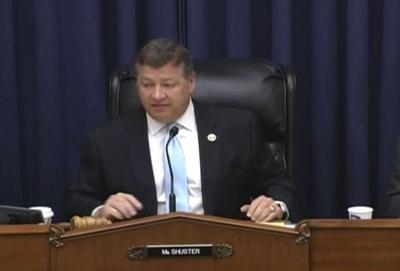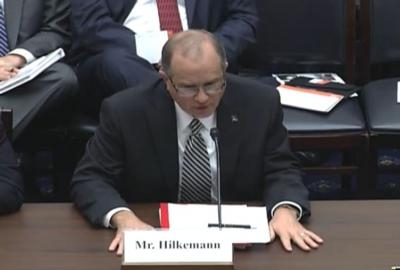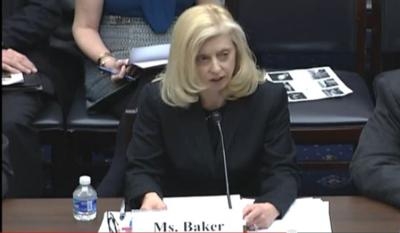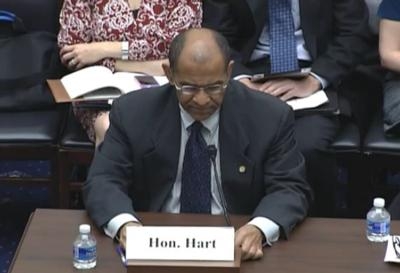Committee Gathers Information About The Effects Of 'Regulatory Burdens' On Manufacturers, Others
The first hearing by the full House Transportation and Infrastructure committee for the 114th Congress was held to examine the process by which the FAA certifies new aircraft and other products.

"Today we are discussing FAA regulatory certification processes which have significant impacts on our nation’s ability to innovate, manufacture and export the very safest products efficiently in an increasingly competitive global market," committee chairman Bill Shuster (R-PA) said in his prepared opening remarks. "FAA is responsible for ensuring every aircraft in our skies is safe; and that those that maintain and fly those aircraft are well-qualified and well-trained. Besides assuring the safety of aircraft, our certification system must be efficient and rational.
"Too often, we are seeing unnecessary regulatory burdens that do not serve to improve actual aircraft safety. It seems to be process…simply for the sake of process. Products and technologies that can actually enhance aircraft safety are often caught in a bureaucratic maze, substantially delaying their implementation and realization of safety benefits. By the time an American company receives certification for a product it submits, the technology is often out of date as competitors elsewhere are able to move more quickly.
"I have heard concerns that our certification processes are much slower than the processes in other foreign countries, resulting in American manufacturers at a disadvantage to foreign competitors who have a more streamlined process to get their products certified and into the market.
"While our aerospace products are the safest in the world, we must also act to ensure that our safety regulations and processes are effective, consistent and keep pace with the modern world, Chairman Shuster said.
The witnesses representing the industry came from Boeing and Duncan Aviation, while a second panel consisted of representative from the FAA, NTSB, and GAO.

Aaron Hilkemann, President and CEO, Duncan Aviation, said the FAA’s inconsistent application of policy can have a profound impact on MRO companies. "The MRO marketplace is extremely competitive due to the fact that it is global in nature," Hilkemann said. "Therefore, Duncan Aviation has to continuously evolve to address advancements in technologies and customers’ expectations.
"Inconsistencies and the ability of the FAA to provide interpretation and application of requirements in this dynamic environment have a direct impact on our business. Our ability to implement improvements, expansions, or changes that affect our competitiveness is reliant on this process."
Dorenda Baker, Director of the FAA's Aircraft Certification Service, defended the agency's processes. "Numerous external forces are affecting our existing certification process: the globalization of aviation, advances in technology, a high velocity of change, and heightened expectations from our stakeholders and the general public," she said. "In order to address these issues and expectations, we are applying safety management principles and using risk-based decision making to leverage our partnerships and make better decisions about where we need to focus FAA resources."

But she also agreed that the system is not perfect. "The FAA is working diligently to address the initiatives recommended by the Section 312 ARC. These initiatives are helping us to identify and address national certification issues; however, we
recognize that may not solve the problems experienced by individual companies," she said in prepared remarks. "To reform certification, the FAA must also implement activities that address issues and expectations at each level. Therefore, the FAA is reexamining how it conducts business and implementing internally driven initiatives at three levels."
Christopher Hart is the Acting Chairman of the NTSB. Hart said in his remarks that the NTSB "has on numerous occasions examined FAA certification processes, pointed out short comings, and issued recommendations to address needed improvements in the these processes. In our investigative work, we have examined the roles of the FAA’s Aircraft Certification Service and the Flight Standards Service. Although both of these offices are part of the Aviation Safety Office, the former is responsible, among other things, for administering safety standards governing the design, production, and airworthiness of civil aeronautical products and overseeing design, production, and airworthiness certification programs to ensure compliance with prescribed safety standards.

"The latter is responsible, among other things, for setting the standards for certification and oversight of airmen, air operators, air agencies, and designees and inspecting, investigating, and enforcing the Federal Aviation Regulations (FAR) and other FAA standards."
"One cannot dispute the overall safety of our aviation system in this country and the hard work of thousands of dedicated and skilled FAA professionals," Hart concluded. "However, as the NTSB has concluded in the course of numerous aviation accident/incident investigations, including the ones summarized in this statement, there are still lessons to be learned and opportunities for improvement in the FAA’s management and oversight of its certification processes."
(Images from hearing video)
 ANN's Daily Aero-Term (05.05.25): Circle To Runway (Runway Number)
ANN's Daily Aero-Term (05.05.25): Circle To Runway (Runway Number) ANN's Daily Aero-Linx (05.05.25)
ANN's Daily Aero-Linx (05.05.25) NTSB Prelim: De Havilland DHC-1
NTSB Prelim: De Havilland DHC-1 Classic Aero-TV: The Boeing Dreamliner -- Historic First Flight Coverage
Classic Aero-TV: The Boeing Dreamliner -- Historic First Flight Coverage Airborne-NextGen 05.06.25: AF Uncrewed Fighters, Drones v Planes, Joby Crew Test
Airborne-NextGen 05.06.25: AF Uncrewed Fighters, Drones v Planes, Joby Crew Test






